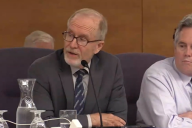You have /5 articles left.
Sign up for a free account or log in.
When members of Congress think they may have a problem on their hands -- or, more cynically, when they want to appear to be taking an issue seriously -- they often turn to the Government Accountability Office. Congress's investigative arm will then examine the situation broadly and report back to the senators or representatives who requested the study and, eventually, to the public. Legislative action sometimes follows, sometimes not, but in the meantime, they are (or at least appear to be) doing something.
That's essentially what happened with a recent GAO study about illegal file sharing on campuses, but with a twist. A House of Representatives subcommittee has requested a survey of colleges' policies and practices on networks that allow students and others to illegally share copyrighted video and audio files. But unlike most studies by the GAO, Congressional aides have insisted that the agency in this instance report not just on the file sharing landscape in the aggregate, but on how individual colleges responded to the survey.
Declining to promise confidentiality to the respondents, college officials predict, is likely to limit the number of participants and render the survey ineffective.
Like many a GAO survey, this one came to pass after higher education leaders fought off an attempt to impose legislative requirements. During last spring's debate over the renewal of the Higher Education Act, Democrats in the House proposed an amendment that would have required colleges to take steps to crack down on illegal file sharing, which college leaders opposed as unnecessary federal regulation. (Many college officials insist that they are already doing plenty to deal with this issue, especially since the problem, some of them argue, is less severe among college students than among other segments of the population.)
The amendment failed, but the lawmakers who proposed it (led by Rep. Howard P. Berman of California, who is the senior Democrat on the House Judiciary Subcommittee on Courts, the Internet and Intellectual Property) continued to pursue a GAO study of file sharing in higher education. College officials said they supported the idea of a study, which would help gauge the extent of the problem.
But as the investigative agency sent out the survey (a blank copy is available for viewing here) in recent days to more than 100 colleges, some college officials realized that the questionnaire and the accompanying cover note did not say, as such surveys almost always do, that the replies would be kept confidential.
When Terry W. Hartle, senior vice president for government and public affairs at the American Council on Education, checked with officials at the GAO, he was told that that aides to the Judiciary subcommittee had insisted that the GAO collect and report back to the panel on the responses of individual institutions. (It isn't clear whether the information about individual institutions would be made public, or if the eventual public report, like most GAO studies, would present information only in the aggregate.)
Paul Anderson, assistant director of the GAO, said Monday that agency policy prohibited him from discussing details about the nature of any of its active surveys, beyond basic information about who had requested the study and its scope. A spokesman for the Judiciary Committee said he would check into the matter but did not provide any details.
Mark A. Luker, vice president of Educause, higher education's main technology association, said it was "unfortunate" that lawmakers and their staffs had adopted this approach. "Peer to peer file sharing is a legitimate issue, and colleges and universities are working to address it," Luker said.
"A survey like this could be a valuable means of finding out the state of the environment," Luker said. But the decision not to make the replies confidential "can hurt the survey by limiting the responses and participation," he added, not because colleges necessarily have anything to hide, but because survey participants tend to be more responsive when their privacy is protected.
Luker said that Educause is alerting its members to the fact that their responses to the GAO survey will not be kept confidential, since the survey materials themselves don't make that clear.









